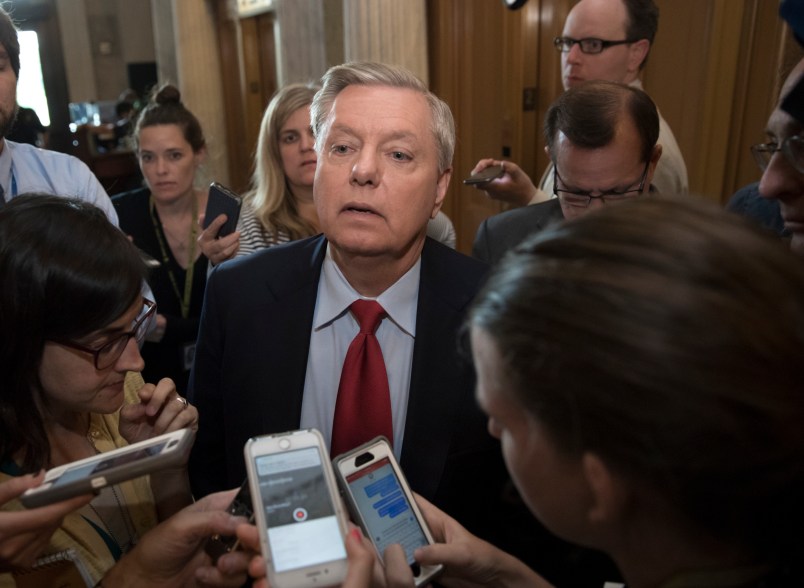Just a few hours after it began, a revolt by a handful of senators opposed to voting on a “skinny repeal” of Obamacare they don’t want to become law fizzled out.
Sen. Lindsay Graham (R-SC), one of the ringleaders of the short-lived revolt, said around 9:30 p.m. ET that after speaking to House Speaker Paul Ryan (R-WI) by phone he was convinced the House would agree to go to conference with the Senate to hammer out a bill.
“He said he doesn’t believe the skinny bill is good policy or good politics,” a weary Graham relayed to a large gaggle of reporters. “He doesn’t want to be the party that repeals part of Obamacare and leaves most of it in place. Paul sees the skinny bill as a vehicle to find a better solution.”
Sen. Ron Johnson (R-WI), another member of Thursday’s brief mutiny against the bill, was similarly won over by these promises. Asked if Republicans now had the votes to pass the “skinny repeal” bill, he said cheerfully: “I hope so. They’ll probably have mine.”
With Graham, Johnson, and other holdouts potentially on board, the Senate is much more likely to pass a bill that only repeals a few provisions in the Affordable Care Act—a combination of proposals that will likely hike premiums and destabilize the market. In theory, the bill is supposed to be a vehicle to get Republicans to the next step: a conference with the House Obamacare legislation where they hope a final bill will be produced that both chambers can pass.
But there’s nothing actually stopping the House, from a legal standpoint, from just taking up the skinny repeal bill for a vote, or taking it up if the conference fails to produce a bill passable in both chambers.
Ryan released a statement earlier on Thursday evening saying he was “willing” to go to conference, but he notably did not rule out the House voting on that skinny bill at some point. A line in his statement requesting the Senate take up whatever comes out of conference first further suggests that the House could pass skinny repeal if the Senate rejects the conference bill.
Sen. Susan Collins (R-ME), a key holdout on the bill, pointed out that there’s no guarantee that the conference could produce a bill any more appealing than the legislation the Senate has already considered and failed to pass.
“I’m worried that a bill coming back from conference could be worse, could have deep Medicaid cuts, which I don’t want to see,” she said.
Ryan’s cryptic statement similarly did not win over skeptics like Sen. Shelley Moore Capito (R-WV), who told reporters: “I wasn’t sure how to interpret it, frankly.”
Capito refused to say how she would vote on the skinny repeal bill. When reporters asked why she wanted to leave the public in suspense, she trilled as she descended a spiral staircase into the Capitol’s basement: “Because it’s fun!”
Republicans can only afford to lose two votes on the bill. Sen. John McCain (R-AZ), who led the revolt along with Graham, is still an unknown. Earlier Thursday evening, he grumbled that Ryan’s statement was “not sufficient,” adding that there is “lot’s more” the Speaker could do to give him a guarantee they would go to conference on the bill.
Later, when asked how his close friend McCain would vote, Graham told reporters: “I think John is rightfully upset with the process. Whatever he does, he’s earned the right to do it.”







Sellouts. Fucking sellouts. All of them.
Destroy the health insurance market, leave 18 to 35 million without health care, take Medicare away from people destitute in mind and finances and children born in poverty…because gop needs to pass a bill…ANY bill.
I really thought they had hit bottom with President Tweedy, but actually they are worse.
McCain apparently is in conference Arizona Governor Doug Ducey who said this on his FB page:
“It’s no secret Obamacare has been a disaster for Arizona and that I want it repealed and replaced. However, I agree with Senator McCain that the bill on the table clearly isn’t the right approach for Arizona. I’ve outlined what I’m for and how to increase flexibility for states to improve our health care system. We want to get the policy right, so my office and Senator McCain’s office will continue to work together closely to achieve the best result possible for Arizonans.”
It sounds like McCain is a no, but I’m not gonna hold my breath. He said he didn’t like Trumpcare and then voted for it.
Posturing vandal sons of bitches. This is just like the sequester, you hold a gun to your head and say don’t make me pull the trigger and somehow you don’t shoot yourself and government gets smaller and smaller and does less and less for anybody who could actually use some help. Sons. Of. Bitches.
I think this thing still is pretty fluid. From CNN it seems like McCain & Graham will align themselves.